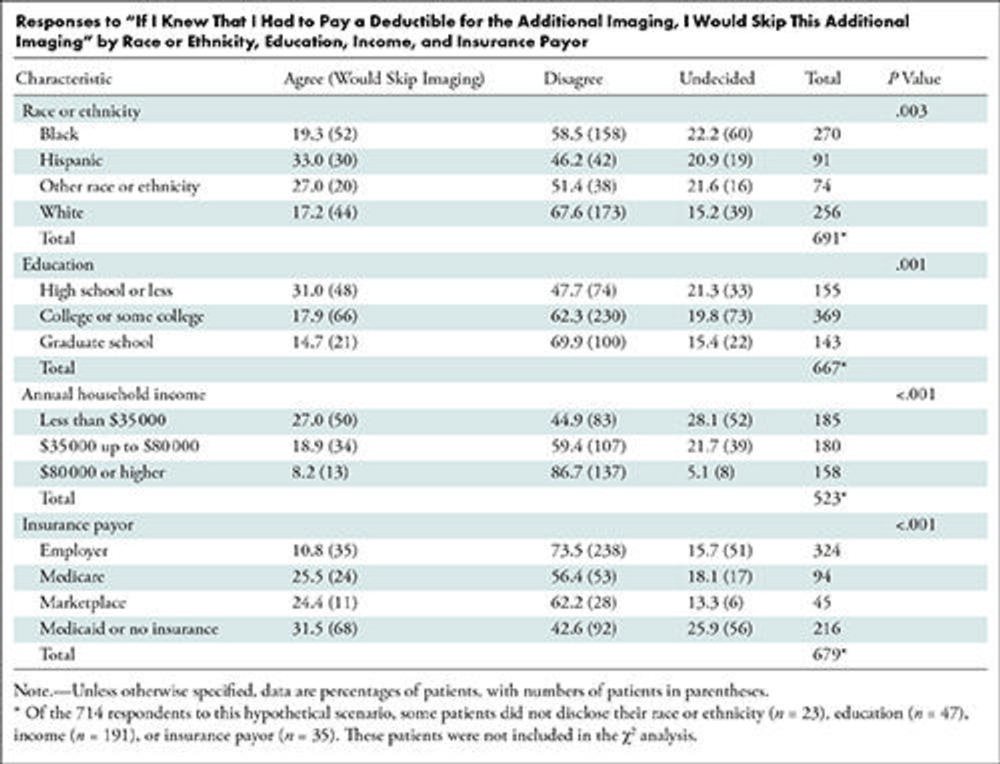Deductible, Co-pay May Lead Women to Skip Breast Follow-up
Released: April 04, 2023
At A Glance
- If they had to pay a deductible, more than 21% of women said they would skip additional testing after an abnormal mammogram finding, and 18% said they would skip the screening mammogram.
- Hispanic women were most likely to skip additional testing.
- The Affordable Care Act removed out-of-pocket costs for screening mammograms under most health plans but does not cover costs for additional imaging or biopsy.
- RSNA Media Relations
1-630-590-7762
media@rsna.org - Linda Brooks
1-630-590-7738
lbrooks@rsna.org - Imani Harris
1-630-481-1009
iharris@rsna.org
OAK BROOK, Ill. – Researchers who surveyed women attending breast cancer screening appointments found that one in five is likely to skip additional testing after an abnormal finding on their mammogram if there is a deductible or co-payment, according to an editorial published in Radiology, a journal of the Radiological Society of North America (RSNA).
Health care costs and insurance premiums have increased in recent years. With the advent of the Affordable Care Act (ACA), high-deductible health plans (HDHPs) have grown in popularity, particularly among younger, healthy people.
It is believed that HDHPs lower overall health care costs by making individuals more cognizant of their medical expenses. The higher deductible also lowers monthly insurance premiums, making these plans an attractive option for healthy people who may typically need coverage only for preventative care or health emergencies.
But while HDHPs offer some advantages, the high out-of-pocket deductible cost—a minimum of $1,500 for individuals and $3,000 for families—may prevent people from seeking necessary care.
"Currently, there is no out-of-pocket payment or co-payment for screening mammography since it's covered under the ACA," said the study's lead author, Michael Ngo, M.D., radiology resident at Boston Medical Center and Boston University Chobanian & Avedisian School of Medicine. "However, any follow-up diagnostic imaging for an abnormal finding seen on screening mammography may require the patient to pay a co-payment or deductible, depending on their healthcare plan."
Dr. Ngo and colleagues wanted to assess the impact that these payments had on a patient's willingness to return for important follow-up imaging.
The researchers surveyed 932 patients presenting for breast imaging at Boston Medical Center between September 2021 and February 2022. The survey was comprised of demographic questions on race, education level, annual household income and insurance payor, as well as scenarios about utilization of breast imaging. There was a variable response rate on questions.
When asked whether they would skip indicated imaging if they knew they had to pay a deductible, of 714 respondents, 151 (21.2%) said they would skip imaging, 424 (59.4%) said they would not skip imaging, and 139 (19.5%) were undecided.
"The patients who were more likely to say they would skip diagnostic imaging tended to be racial/ethnic minorities, have a lower educational level, have a lower-income household, are on Medicaid or have no insurance at all," Dr. Ngo said.
The groups with the highest percentage of responses indicating they would skip additional imaging were Hispanic (33.0%), high school educated or less (31.0%), household income less than $35,000 (27.0%) and Medicaid/uninsured (31.5%).
"Prior research has shown that these groups tend to already have lower adherence to preventative services, including breast cancer screening, and tend to have worse breast cancer outcomes," Dr. Ngo said. "Based on these results, these out-of-pocket payments may account for at least a part of the delay in seeking care. This, in turn, leads to delays in breast cancer diagnosis and treatment, increases overall breast cancer mortality and exacerbates existing gaps in breast cancer care in women who already have financial barriers in care."
The survey also asked whether respondents would forgo the initial screening mammography exam if they knew they would have to pay a deductible for follow-up tests. Of 707 respondents, 129 (18.3%) said they would skip the screening mammography exam, 465 (65.8%) would not skip mammography, and 113 (16.0%) were undecided.
Identifying socioeconomic barriers to health care is critical in addressing existing disparities and ensuring better outcomes for vulnerable patient populations. The researchers hope that these findings will be useful in efforts to remove financial barriers to care.
"We hope these results can be used to advocate for legislation to eliminate out-of-pocket expenditure for screening diagnostic imaging follow-up to alleviate the existing healthcare disparities," Dr. Ngo said.
"Effect of a High-Deductible Health Plan on Patients' Willingness to Undergo Indicated Breast Imaging." Collaborating with Dr. Ngo were Muhammad Qureshi, M.B.B.S., M.P.H., Geunwon Kim, M.D. Ph.D., Michael D. C. Fishman, M.D., and Priscilla J. Slanetz, M.D., M.P.H.
In 2023, Radiology is celebrating its 100th anniversary with 12 centennial issues, highlighting Radiology's legacy of publishing exceptional and practical science to improve patient care.
Radiology is edited by Linda Moy, M.D., New York University, New York, N.Y., and owned and published by the Radiological Society of North America, Inc. (https://pubs.rsna.org/journal/radiology)
RSNA is an association of radiologists, radiation oncologists, medical physicists and related scientists promoting excellence in patient care and health care delivery through education, research, and technologic innovation. The Society is based in Oak Brook, Illinois. (RSNA.org)
For patient-friendly information on screening mammography, visit RadiologyInfo.org.

Figure 1. Bar graph shows the percentage of women who agreed with the statement “If I knew that I had to pay a deductible for the additional imaging, I would skip this additional imaging” by insurance payor, annual household income, education and race or ethnicity.
High-res (TIF) version
(Right-click and Save As)


